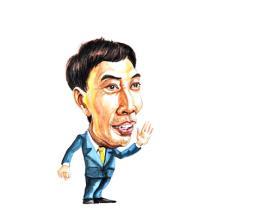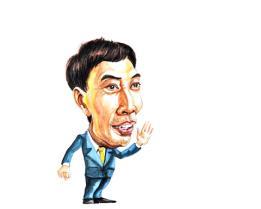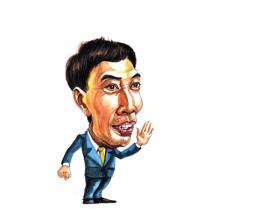Best known for turning around US retailer Ashley Stewart, Rhee argues that financial logic alone cannot create lasting value. His book blends investment experience with personal stories to show how humanity drives true economic success.

Việt Nam’s rapid economic rise has become one of Asia’s most compelling success stories, drawing strong interest from global investors. Yet questions remain about sustainability, inclusivity and long-term competitiveness. James Rhee, an investor, CEO, TED speaker and bestselling author of Red Helicopter, believes the answers lie in an unconventional framework: kindness, math and storytelling.
Best known for turning around US retailer Ashley Stewart, Rhee argues that financial logic alone cannot create lasting value. His book blends investment experience with personal stories to show how humanity drives true economic success.
During his visit to Việt Nam for university lectures, Việt Nam News and Law reporter Ly Ly Cao spoke with him about why his philosophy resonates here and what lessons it offers as the country enters its next phase of growth.
You have said that kindness, math and storytelling form the foundation of lasting value. How do these three connect and why do they matter for Việt Nam now?
Business leaders often see kindness and math as opposites: one soft, one hard. But in practice, they are complementary. Math represents truth, patterns and discipline. Kindness represents humanity and the willingness to invest in others, rather than solely serving oneself. Storytelling connects the two, creating a shared narrative that helps organisations and countries move forward together.
For Việt Nam, this is highly relevant. The country has been one of the fastest-growing economies globally, attracting record levels of foreign direct investment. But math tells us growth that is too fast, without balance, can carry hidden costs — inequality, environmental pressures or demographic shifts. Kindness ensures that growth includes people and communities. Storytelling ensures that the Vietnamese identity remains intact as the country integrates deeper into global supply chains.
If Việt Nam can grow with kindness, measure its growth with mathematical honesty, and tell a unifying story, its success will not only be fast, but also sustainable.
Việt Nam has transformed dramatically in just a few decades. What parallels do you see between national growth and corporate turnarounds?
Every successful turnaround begins with clarity of identity, what I call the 'red helicopter story'. For companies, that means understanding their culture and being honest about their strengths and weaknesses. For nations, it means asking fundamental questions: Who are we? What do we value?
Việt Nam’s story is unique. Its history includes hardship, but also tremendous resilience and creativity. That narrative is just as important as GDP growth rates or export figures. If Việt Nam tries to replicate another country’s growth model wholesale, it may deliver results, but at the expense of social cohesion. We have seen examples elsewhere in Asia where rapid GDP growth has been accompanied by declining birth rates, mental health challenges, and rising inequality.
Long-term success requires combining universal truths: economic logic, global trade rules and the mathematics of productivity, with deep respect for one’s own cultural DNA.
In my experience, both in business and in observing countries, ignoring your own people’s voice in favour of external formulas is a mistake. Việt Nam has the opportunity to chart a path that is globally competitive yet authentically Vietnamese.
The title Red Helicopter comes from a childhood story of generosity. How does that shape your leadership philosophy and how might it resonate in Việt Nam?
The story is simple: when I was five, I shared my lunch with a boy who had none. His father later gave me a red toy helicopter as a thank you, though I didn’t understand why at the time. For me, that helicopter symbolises intuitive generosity, helping without expecting a reward.
As I grew older, professional life often became about rigid expectations: credentials, exams, profit targets. But the helicopter reminded me that true agency comes from combining knowledge with kindness and creativity. That approach enabled me to revive a failing company by listening to employees and building trust, rather than just applying financial models.
I think Việt Nam understands this lesson. This is a country that has endured war and poverty, but emerged with resilience and a strong sense of community. The 'red helicopter' spirit, solving problems with heart and pragmatism, can be a guiding principle as Việt Nam scales its economy while protecting its social fabric.
From your experience leading the turnaround at Ashley Stewart, what is the most important lesson about balancing profit and purpose?
The biggest lesson is the importance of purpose. When businesses or countries lose sight of why they are doing something, they lose not only direction but resilience. Short-term profits or growth numbers may look good, but at what cost?
In investing, legends like Warren Buffett and Charlie Munger emphasise long-term thinking. They choose high-integrity leaders, make a few wise bets and let compounding do its work. The same principle applies to nations. Việt Nam must think in 50- or 100-year terms. That may mean making investments that are not immediately profitable, but build competitiveness and social stability for the long run.
Rapid GDP growth is not equivalent to sustainable success. Success requires balancing purpose with profit, ensuring that people, culture and environment are not sacrificed for short-term gains.
What advice would you give to young Vietnamese leaders about finding their own 'red helicopter'?
Your 'red helicopter' is not necessarily a big achievement. It’s a moment when you solved a problem because you wanted to, not because someone told you to. It gives you agency, the belief that you can shape outcomes.
For young leaders in Việt Nam, especially in an era of rapid digitalisation and AI, it is tempting to look for shortcuts or simple formulas. However, true leadership stems from engaging in hard work, struggling, failing, adapting, and building. That’s how you grow both as a person and as a society.
Việt Nam’s next generation will play a pivotal role in shaping how the country balances economic opportunity with cultural preservation. If they embrace kindness, mathematical rigour and authentic storytelling, they can lead Việt Nam into an era of prosperity that is both competitive and deeply human. — BIZHUB/VNS




